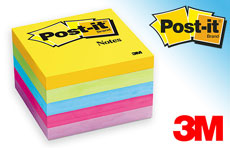In March, 3M announced a new policy that will guide its paper supply chain, which the conservation community is hailing.
Until now, its masking tape and sandpaper came from plundering Canada’s boreal forest, and sticky notes from unsustainable logging in the US, says ForestEthics, whose multi-year campaign is behind 3M’s policy.

Importantly, 3M is cutting the cord with the paper industry’s Sustainable Forestry Initiative (SFI) certification, which has as many loopholes as you would expect from that industry. Instead, it will use Forest Stewardship Council (FSC) certification, the independent gold standard.
SFI is "funded, governed, and founded by the logging industry," says ForestEthics, and "offers no legitimate environmental protection."
"Going forward, its supply chain will be held accountable to one of the highest standards in the industry for environmental protection and respect of human rights," says ForestEthics.
With 5,000 direct suppliers in over 70 countries, 3M’s policy should be felt across the industry.
3M will:
- work with suppliers to trace the origin for all wood, pulp and paper it buys and will not source fiber obtained from high-conservation value forests (as defined by the High Conservation Value Resource Network).
- ensure suppliers have received consent by indigenous peoples and local communities impacted by logging.
- publicly report progress on chain of custody, establish publicly reported benchmarks for recycled fiber and tree-free fiber, as well as on the amount of FSC fiber used.
- cease doing business with suppliers who violate this policy. It has already severed ties with several suppliers.
- reduce the amount of paper and pulp it uses and increase the use of recycled paper and fiber.
3M cancelled its contract with Indonesia’s Royal Golden Eagle Group because of unsustainable logging and poor human rights practices, and has put Canada’s largest logger, Resolute Forest Products – which lost FSC certification – on notice because of fractious relationships with First Nations relationships, logging caribou habitat and other High Conservation Areas.
3M is otherwise a corporate leader on sustainability, continuously reducing emissions since 1990.
Learn about the High Conservation Value Resource Network, which determines .
